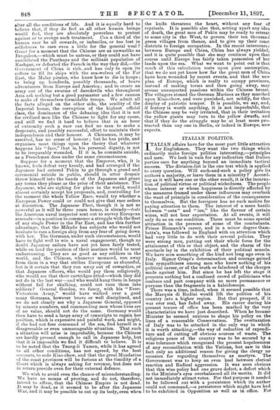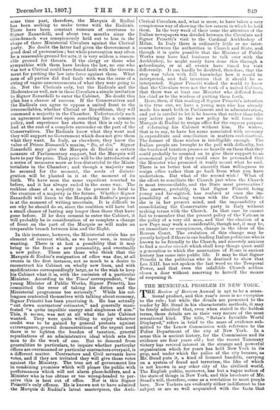ITALIAN POLITICS.
ITALIAN affairs have for the most part little attraction for Englishmen. They want the two things which ordinarily make foreign politics interesting,—principles and men. We look in vain for any indication that Italian parties care for anything beyond an immediate tactical success. The division-list is the one test which is applied to every question. Will such-and-such a policy give its authors a majority, or leave them in a minority ? Accord- ing as it will have one or the other result, it is the incarna- tion of political virtue or political wickedness. The people whose interest or whose happiness is directly affected by the measures framed under these influences may overlook the want of principle in consideration of the consequences to themselves. But the foreigner has no such motive for paying attention to them. The interest of a mere battle between " outs" and " ins," like the flavour of certain wines, will not bear exportation. At all events, it will only do so on one condition. There must be some special attraction in the persons of some of the combatants. Prince Bismarck's career, and in a minor degree Gam- betta's, was followed in England with an attention which had very little to do with their several policies. They were strong men, putting out their whole force for the attainment of this or that object, and the charm of the spectacle lay in the exhibition of their political muscle. We have seen something of the kind not long ago even in Italy. Signor Crispi's determination and courage gained him sympathisers among men who knew nothing of his political career, or of the truth or falsehood of the charges made against him. But since he has left the stage it presents nothing but a confused crowd of politicians who coalesce and part company with no more permanence or purpose than the fragments in a kaleidoscope.
There was a time, indeed, when it seemed possible that the Marquis di Rudini would lift the politics of his country into a higher region. But that prospect, if it was ever real, has faded away. His career during his present tenure of office has been marked by the very characteristics we have just described. When he became Minister he seemed anxious to shape his policy on the lines of a reasonable Conservatism. The overtaxation of Italy was to be attacked in the only way in which it is worth attacking,—the way of reduction of expendi- ture and of cutting off obvious sources of waste. The religious peace of the country was to be secured by a wise tolerance which recognised the present hopelessness of any reconciliation with the Vatican, but saw in this fact only an additional reason for giving the clergy no occasion for regarding themselves as martyrs. The Government was to keep an even keel between clerical reaction and Radical aggression. It was soon obvious that this wise policy had one grave defect, a defect which in the Minister's eyes overbalanced all its merits. It did not immediately attract votes. For that purpose it needed to be followed out with a persistence which its author could not command,—a persistence which might have had to be exhibited in Opposition as well as in office. For some time past, therefore, the Marquis di Rudini has been seeking to make terms with the Radicals. There have been constant rumours of overtures to Signor Zanardelli, and about two months since the olive-branch was conspicuously held out to him in the shape of three Ministerial Circulars against the Clerical party. No doubt the latter had given the Government a good deal of provocation ; but while provocation may often be a reasonable ground for acts, it is very seldom a reason- able ground for threats. If the clergy or those who sympathise with them have broken the law, no one who was not a Clerical could have found fault with the Govern- ment for putting the law into force against them. What men of all parties did find fault with was the issue of a string of vague announcements of what they were going to do. Not the Clericals only, but the Radicals and the Moderates as well, saw in these Circulars a simple invitation to Signor Zanardelli to enter the Cabinet. No doubt this plan has a chance of success. If the Conservatives and the Radicals can agree to oppose a united front to the irreconcilables, whether Clerical or Republican, they will command a majority in the Chamber. Unfortunately such an agreement must rest upon something like a common policy, and experience has shown that this is only to be had at the cost of a complete surrender on the part of the Conservatives. The Radicals know what they want and they will support no Government which does not give them what they want. In Italy, as elsewhere, they know the value of Prince Bismarck's maxim, "Do, ut des." Signor Zanardelli may give the Marquis di Rudini a certain measure of Parliamentary support, but the Marquis will have to pay the price. That price will be the introduction of a series of measures more or less distasteful to the Minis- terialists in the Chamber ; and though a majority may be secured for the moment, the seeds of disinte- gration will be planted in it at the moment of its birth. We have seen the same expedient resorted to before, and it has always ended in the same way. The reckless chase of a majority in the present is fatal to the creation of a majority in the future. Whether Signor Zanardelli will listen to the Marquis di Rudini's prayers is at the moment of writing uncertain. It is difficult to see why he should do so, since the coalition will have but a small chance of lasting any longer than those that have gone before. If he does consent to enter the Cabinet, it will probably be in consideration of so complete a change of front on the part of the Marquis as will make an irreparable breach between him and the Right.
In this instance, however, the Ministerial crisis has an element of interest which, as we have seen, is usually wanting. There is at last a possibility that it may bring to the front a new personality, and eventually a new policy. There are those who think that the Marquis di Rudini's resignation of office was due, at all events in the first instance, not so much to a desire to reconstruct his Cabinet on wholly new lines, and with modifications correspondingly large, as to the wish to keep his Cabinet what it is, with the omission of a particular Minister. According to the Times' correspondent, " the young Minister of Public Works, Signor Prinetti, has committed the error of taking his duties and the Ministerial programme too seriously." While his col- leagues contented themselves with talking about economy, Signor Prinetti has been practising it. He has actually "cut down contractors' estimates," and generally mani- fested "a quits impolitic energy and singleness of aim." This, it seems, was not at all what the late Cabinet wanted. They were quite willing to enjoy whatever credit was to be gained by general protests against extravagance, general demonstrations of the urgent need there is to lighten the burden of taxation, general repudiations of an administrative ideal which sets five men to do the work of one. But to descend from generalities to particulars, to inquire whether particular offices are overmanned or particular contractors overpaid, is a different matter. Contractors and Civil servants have votes, and if they are irritated they will give those votes against the Ministry. The true art of government lies in combining promises which will please the public with performances which will not alarm place-holders, and a Minister who is too obtuse or too wrong-headed to per- ceive this is best out of office. Nor is this Signor Prinettea only offence. He is known not to have admired the Marquis di Bodies latest masterpiece, the Anti- Clerical Circulars, and, what is more, to have taken a very conspicuous way of showing the low esteem in which he held them. In the very week of their issue the attention of the Italian newspapers was divided between the Circulars and Signor Prinetti's visit to the Cardinal Archbishop of Milan. In Italy there is ordinarily little or no inter- course between the authorities in Church and State, and though it is quite possible that the Minister of Public Works may have had business to talk over with the Archbishop, he might easily have done this through a subordinate, or at all events have timed his visit differently. It can hardly be doubted, therefore, that the step was taken with full knowledge how it would be interpreted, and full intention that it should be so interpreted. Signor Prinetti wished the world to know that the Circulars were not the work of a united Cabinet, that there was at least one Minister who differed from his chief as to the wisdom of putting them forth.
Here, then, if this reading of Signor Prinetti's intention is the true one, we have a young man who has already made his mark both in Parliament and in administration, and yet is careful to let it be known that rather than take any active part in the new policy he will force the Marquis di Rudini to resign office for the express purpose of reforming his Cabinet without him. He wishes,. that is to say, to have his name associated with economy in expenditure and conciliation in matters ecclesiastical. The former of these wishes is intelligible enough. The Italian people are brought to the poll with difficulty, but the burden of taxation presses so heavily on them that they could probably be counted on to give their support to an economical policy if they could once be persuaded that the Minister who promised it really meant what he said. There is no better test of sincerity than willingness to resign office rather than go back from what you have undertaken. But what of the second wish ? What of the effort to conciliate the Church just when the Church is most irreconcilable, and the State most provocative ? The answer, probably, is that Signor Prinetti being young and far-sighted, has realised at once the im- possibility of making terms with the Church while she is in her present mind, and the impossibility of consolidating the Conservative party in Italy without making terms with the Church. In that case lie cannot fail to remember that the present policy of the Vatican is the policy of a very old man, and that the election of a new Pope may work a considerable, though not, it may be, an immediate or conspicuous, change in the ideas of the Roman Court. The evolution of this change may be greatly helped if there is one leading Italian politician who is known to be friendly to the Church, and sincerely anxious to find a modus vivendi which shall keep things quiet until a generation to which the annexation of Rome is ancient history has come into public life. It may be that Signor Prinetti is the politician who is destined to show that Leo XIII. has not spoken the last word on the Temporal Power, and that even the infallible Church seldom closes a door without reserving to herself the means of reopening it.











































 Previous page
Previous page